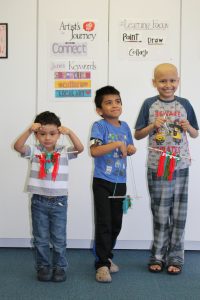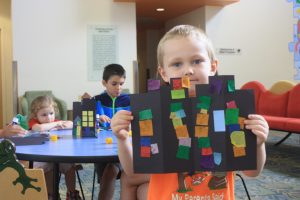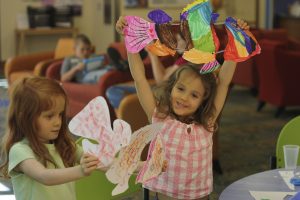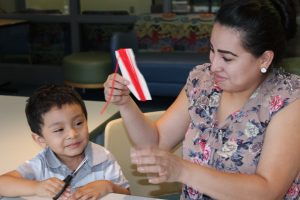Creating Art is a Family Affair
One day not very long ago, I was teaching at the art table in the Zeis Pediatric Hematology/Oncology clinic at Mission Hospital, and a family came in for their son’s yearly off-treatment follow-up appointment. I had known this family for a long time, and had really gotten to know them during the three years Ryan was undergoing treatment for leukemia. Ryan’s sister, Ellen, was still pre-school-aged during the time he was on treatment, and she came with Ryan and their parents to every one of his appointments. In their first few visits, I remember Ellen as a little tornado of toddler energy who would circle around the table until someone grabbed her hand and led her back to the room or outside to run around in the garden.
I also remember that somewhere along the way, Ellen started staying back to do art with me at the table while Ryan had his blood drawn or was getting chemotherapy. During those times, when it was just the two of us, Ellen was focused and patient, the tornado energy quiet. She would cut and glue or paint for long periods. She would smile and sometimes squeal in delight with her work. And she almost never talked.
Looking back on that time, I can’t say with certainty what it was about the art table that had this calming effect on Ellen; whether it was the art itself, or the individual attention, or maybe just the simple fact that she wasn’t cooped up in a tiny patient room. It was probably a bit of all of those things. But what I do know is that the art table was a refuge for her on those long clinic days during Ryan’s treatment: a chance to be settled, creative, and engaged.
At Arts For Life, this is a critical part of what we do: we offer art to to everyone. That means patients, yes. But siblings and family members, too. Cousins come to the art table. Parents. Grandparents. Just the other day, we had a patient who invited her best friend to spend the night before her clinic appointment just so the two of them could do art together at the table. For the overworked and overwhelmed parents of a sick child, being able to bring their well children to an appointment, knowing they’ll be engaged, challenged, and inspired at the art table means one less thing they have to worry about. For the siblings, like Ellen, who sometimes can feel lost in the shuffle of a family in crisis, the art table offers the opportunity to express themselves and forge their own connections.
When I saw Ellen and Ryan recently, they had, like all healthy children, gotten bigger and older. But when Ryan got called back to see the doctor, and Ellen didn’t make a move to leave the table, it felt just like it did five years ago, in those months Ryan was on treatment. Ellen stayed out at the table with me, making art, smiling, and never talking. The appointment was quicker than those of the old days, and she was just barely able to finish a project before her brother and parents were ready to go. “You know what?” I said, as she put the finishing touches on her drawing, “You’ve gotten really good at this. You must have been practicing your drawing skills. I didn’t even know, when you were three, that you had this hidden talent!”
Ellen smiled shyly, dropped the colored pencils back in their tray, and turned to follow her family to the elevator, still not saying a word. They rounded the corner, and as soon as they were out of sight, I heard her say, in a bold and unfamiliar voice: “Mom, do you know that I’m really good at this? Did you know this was my hidden talent?”
This little gem of a moment is one I keep at the front of my mind and come back to often. If I can know that one quiet patient or sibling goes home from the hospital not thinking about how hard/depressing/uncertain/out of control/boring her visit was, but instead thinking of how good she is at painting, or how proud she is of her work, or what project she’s going to do next time, then I am satisfied. We can’t change the medical outcomes, but we can – and do – transform the hospital experience.



